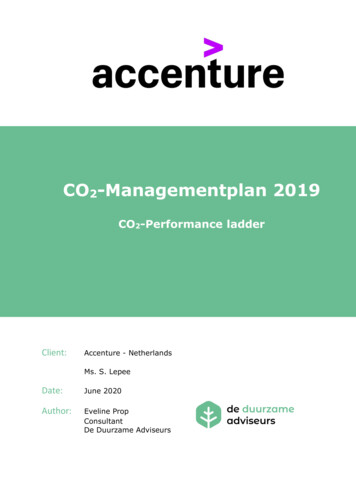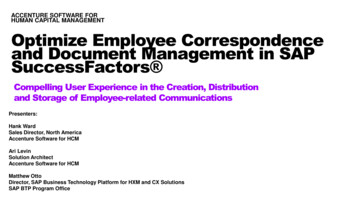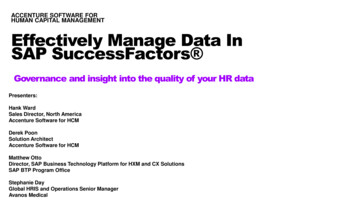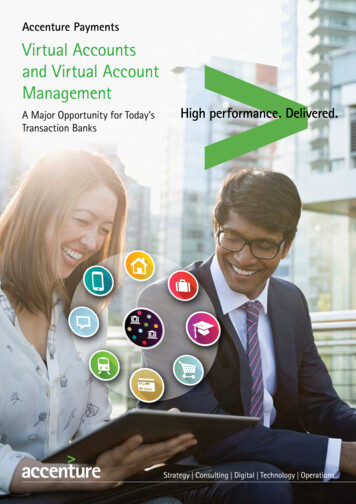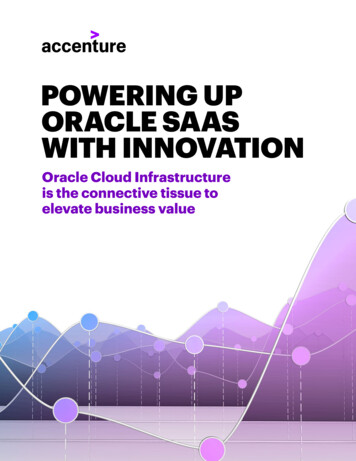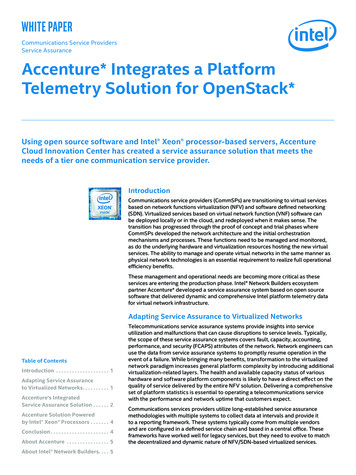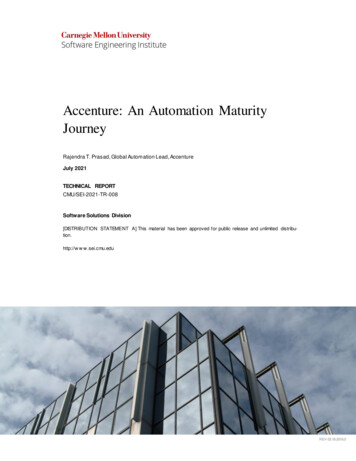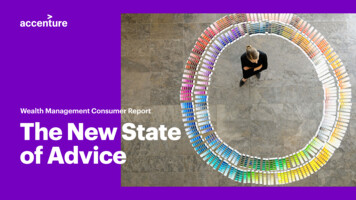
Transcription
Wealth Management Consumer ReportThe New Stateof Advice
ContentsSection 1: Introduction . . . . . . . . . . . . . . . . . . . . . . . . . . . . . . . . . . . . . . . . . . . . . . . . . . . . . . . . . . . . . . . . . . . . . . . . 3Section 2: Our survey findings in more detail . . . . . . . . . . . . . . . . . . . . . . . . . . . . . . . . . . . . . . . . . . . . . . . . 8A complex and changing industry landscape. . . . . . . . . . . . . . . . . . . . . . . . . . . . . . . . . . . . . . . . . . . . . . . . . . . . . . 10The impact on advice: What types of advice are clients willing to pay for?. . . . . . . . . . . . . . . . . . . . . . . . . . . . 13The impact on the relationship: Who do clients trust to deliver advice? . . . . . . . . . . . . . . . . . . . . . . . . . . . . . . 15The impact on delivery: How do clients want to receive advice?. . . . . . . . . . . . . . . . . . . . . . . . . . . . . . . . . . . . . 17The impact on time: When do clients want advice?. . . . . . . . . . . . . . . . . . . . . . . . . . . . . . . . . . . . . . . . . . . . . . . . . 19The impact on engagement: What qualities are most important in the client relationship?. . . . . . . . . . . . . 21Section 3: The call to action. . . . . . . . . . . . . . . . . . . . . . . . . . . . . . . . . . . . . . . . . . . . . . . . . . . . . . . . . . . . . . . . . . 22The new state of advice. . . . . . . . . . . . . . . . . . . . . . . . . . . . . . . . . . . . . . . . . . . . . . . . . . . . . . . . . . . . . . . . . . . . . . . . . . 23Embracing a new business model: Holistic advice . . . . . . . . . . . . . . . . . . . . . . . . . . . . . . . . . . . . . . . . . . . . . . . . . 25Key tenets in the new state of advice. . . . . . . . . . . . . . . . . . . . . . . . . . . . . . . . . . . . . . . . . . . . . . . . . . . . . . . . . . . . . . 27Section 4: The way forward . . . . . . . . . . . . . . . . . . . . . . . . . . . . . . . . . . . . . . . . . . . . . . . . . . . . . . . . . . . . . . . . . . 282Wealth Management Consumer Report: The New State of Advice
Section 1Introduction3Wealth Management Consumer Report: The New State of Advice
A lot can change in a short time.The events over the last year acceleratedan industry-wide shift in consumers’need for financial advice like never before.At the same time, we’ve witnessed an emerging class of newlyengaged investors clustering around specific demands, such as aninterest in cryptocurrency and environmental, social and governance(ESG) investing. These shifts point to unique segments of underservedinvestors seeking personalized advice across a broad set of financialneeds, which creates an opportunity for wealth managers to expandtheir advice offerings beyond managing investments. We woulddescribe this as the industry’s maturation from hybrid to holistic advice.4Wealth Management Consumer Report: The New State of Advice
Our previous consumer-facing publication,The New Face of Wealth Management: In theEra of Hybrid Advice,1 focused on how adviceis consumed and the wave of innovation thatestablished digitally enabled, client-centric advicedelivery. Today, clients have come to expect ahybrid advice experience that combines digital,virtual and human interaction in a personalizedmanner under their control. The question thenbecomes, are the hybrid experiences availabletoday delivering quality advice when clients needit and are they delivering the right outcome?Based on our survey findings, our view is sometimes.To better understand the current state of advice,we set out to unpack client needs. Covid-19sharply brought into focus some of the emerginggaps many wealth managers might haveoverlooked, altering the type of advice clientsrequire and forcing them to support a fully digitaland human service model. In one of our mostcomprehensive wealth management surveys,5we explored what types of advice clients want;who they trust to deliver it; how and when theywant advice; and what they value in their advisorrelationship. Through this effort, we wanted tobetter understand current and emerging clientsegments, the type of advice required for each,and how wealth managers could ultimately delivera holistic and personalized experience at scale.Generation Z and Millennial investors weremore than twice as likely as Baby Boomersto have asked their advisor about ESGinvestments (80% and 63%, respectively,versus 27%).A growing client demand for advice proves out,as 52% of respondents in our survey indicatedsaving and planning increased in importanceover the last year and remains a priority forfuture financial goals, while 45% felt the sameabout investment and portfolio management.Interestingly, we found that while many clientsare largely satisfied with current advice offerings,55% feel the advice they receive is too genericand another 55% also believe that they coulddo a better job investing themselves by makingdecisions that create better returns net of fees.This indicates that meaningful opportunitiesfor new advice offerings exist.Baby BoomersGeneration Z80%Millennials63%27%Less likelyMore likely95% of Generation Z and 83% ofMillennial investors said they wouldconsider wealth products and servicesoffered by Google, Apple or Facebook.Generation Z95%Millennials83%Baby Boomers30%Less likelyMore likelyWealth Management Consumer Report: The New State of Advice
To define this new state of advice,we cast a wide net across location, age,gender, ethnicity, employment, education,profession and current provider. A person’srelationship with money is private, individualizedand complicated, so simply looking acrossassets under management (AUM) did notseem enough. By further segmenting adviceby demographic parameters, we uncoveredopportunities for wealth management firmsto meet the diverse needs of underservedclients across the spectrum.What constitutes relevant advice:Almost 90% of mid-High Net WorthInvestors (HNWI) with 10 million or morein personal wealth felt the advice providedto them by their advisor was too generic.Who values advice: 79% of investors,including 85% of Generation X and 91%of Millennial investors, expect their advisorto offer banking and insurance products.How clients want advice delivered:69% of respondents would consider usingGoogle, Apple or Facebook to manage theirmoney if these channels featured a wealthand money management offering.When clients decide to look elsewherefor advice: 51% of mid-HNWI indicated theywould seek a new advisor to oversee all oftheir assets upon receiving a large sum ofmoney beyond an employment bonus.Who clients trust for advice: 71% of clientswant to engage with an advisor whose valuesand political leanings are aligned with their own.And 69% of clients want an advisor who interactswith and considers input from their spouse.6Wealth Management Consumer Report: The New State of Advice
Servicing clients by providing holistic advicerequires access to the right products, targetedto the right client, and shared contextually atthe right point in time. Recent events have alsoled to a greater demand for a more diverseand accessible product offering that reflectsclients’ social and emotional values beyondwealth growth and preservation, e.g., demandfor socially responsible investing (SRI), financialwellness services and ESG investments.Clients are increasingly looking for holisticofferings, a deeper relationship with their advisor,and a seamless experience underpinned by trust.Almost four in ten respondents (39%) in our surveywanted to hear from their advisor more proactively.Nearly one-third (28%) are willing to take moremeetings, suggesting the lines betweenoutreach, engagement and offeringsare increasingly blurring.The following dynamics create a setof opportunities for wealth managers tofurther differentiate their advice offerings: Clients need to see the value in an adviceoffering, which should naturally extendfrom a firm’s unique differentiators, suchas brand, product offering and services. Emerging client segments require holisticadvice propositions that evolve and guideclients throughout the advice lifecycle. Holistic advice requires a breadth of guidance,products and services beyond investments,delivered in the right context to meet aclient’s financial, emotional and social goals. A digitally-enabled advice experienceis expected and must be seamlesslyintegrated with increased access,personalization and intelligence.Let’s explore the new state of advice.7Wealth Management Consumer Report: The New State of Advice
Section 2Our survey findingsin more detail8Wealth Management Consumer Report: The New State of Advice
To anchor our survey and further define the new state of advice,we first needed to define advice before analyzing consumption preferencesand habits. Historically, advice has been customized by basic wealth tierand demographics, assuming relatively homogeneous needs acrosssegments. By Accenture’s definition, advice is comprised of clientperspective and engagement in a trusted relationship that delivers valuefor the client’s financial, emotional and social well-being (see Figure 1).Acting on these elements above requires wealth managers to think differentlyand act differently. Now is the time to double down on the new state of advice.Figure 1: How Accenture defines financial adviceAdvice is the function (f) of perspective plus client engagement to the power of relationship.A f(P CE)Portfolio valueFinancial valueEmotional value Societal valueRP: PerspectiveCE: Client EngagementR: ource: Accenture9Wealth Management Consumer Report: The New State of Advice
A complex and changing industry landscape.The wealth management industryhas experienced explosive growthand new demand for servicesover the last several years.10This growth was fueled by rising investibleassets and global diversification of increasinglysavvy customer segments distinguished byvaried investment preferences. Ongoing clientdemand, in turn, was driven by increasedlongevity, a global need for retirement savingand an increased focus on financial wellness.However, the pandemic added in a layer of industrycomplexities. Those triggered a new set of priorities,leading clients to think differently about theirfinancial health. In some cases, it even led peopleto make unusual investment decisions (considerthe recent meme stock phenomenon—wherestocks have gone viral online due to social mediahype or a surge of retail investor interest).Wealth Management Consumer Report: The New State of Advice
Overall, the wealth management industry faces a new set of challenges, such as expanding clientneeds, changing demographics, increasing demand, competition and money in motion:Client needsThere’s an increased appetite for adviceunderpinned by tailored educationalcontent and products that is highlycustomized to clients’ point-in-timeneeds and investment preferences.CompetitionMore firms are deploying strategiesconverging on the emerging wealth andmass affluent segments. And many nontraditional players now also offer simplifiedexperiences and education for new investors.11ChangingdemographicsIncreasing demandAs advice becomes more individualizedand traditional client boundaries disappear,new microsegments are emerging thatreflect different ways clients want toengage and who they trust for advice.Changing client outlooks are impacting lifeplans and advice needs. As a result, wealthmanagers face a deluge of new customersand existing clients essentially asking thesame questions: “What do I need to do today?”and “What do I need to plan for in the future?”Money in motionA significant amount of money will be changinghands, often multiple times, in the coming yearsdue to intergenerational wealth transfer. Our samplepopulation demonstrated that nearly one-third oftheir money (28%) is expected to leave existingadvisors. This point-in-time reference has bigimplications across a much larger segment.Wealth Management Consumer Report: The New State of Advice
The COVID-19 pandemic understandablycut across location, wealth bands, education,profession, age and gender to impact everyclient differently. At the same time, it arguablyexacerbated many existing personal wealthchallenges. For example, when we asked oursurvey participants to indicate their top threefinancial goals, 68% selected saving and investingto generate wealth compared to those morefocused on lowering debt (28% of respondents)or saving for a short-term goal like a vacation(38% of respondents). We also found over halfof all respondents (56%) want a holistic wealthmanagement offering that includes advice, riskprotection and lending products. Would this havebeen the same in March 2020, pre-pandemic?Will this hold true through March 2022?the economy have worsened the situation forsome people even further as the disconnectbetween markets and economics diverges:During the pandemic, client household balancesheets faced unprecedented challenges thatremain in effect today. The American RescuePlan Act of 2021 offered relief, but inflationand ongoing supply chain challenges in The majority of U.S. debt is held by thosebetween the ages of 30 and 59, with over 10 trillion in aggregate debt, also accordingto The New York Federal Reserve.312 About 50% of non-retired adults in the USsay the economic impact of the pandemichas made it harder for them to achieve theirlong-term financial goals, according to aMarch survey from The Pew Research Center.2 Aggregate household debt balances increasedby 313 billion quarter-over-quarter in 2Q 2021,over three quarters of a trillion dollars more( 812 billion) more than year-end 2019.The figure hit 14.96 trillion, according toThe New York Federal Reserve’s Q2 2020 QuarterlyReport on Household Debt and Credit. 68% of U.S. respondents in a recent Pew survey2indicated they believe children today willencounter more financial hardships as adultswhen compared to their parents. This representsan 8% increase from a similar question postedin 2019. Less than one-third of respondentsbelieve their children would be better offfinancially when compared to their parents.4The pandemic highlighted the industry’s relianceon digital access and tools. It accelerated the riseof digital trading platforms and investor interestin digital financial products like non-fungible tokensand bitcoin. Both have seen an influx of newand existing clients clamoring for themas a “component” of a personal wealthmanagement strategy, arguably confusingthe product with planning. At the same time,social media platforms became an innovativesource of information, consumable in small bytesand curated for the client. There’s now a perfectstorm of more clients, more products and moredemand for firms to manage than ever before.Wealth Management Consumer Report: The New State of Advice
The impact on advice: What types ofadvice are clients willing to pay for?Investors of today have almostlimitless access to content andthe vehicles to empower themto make investment decisions.This proliferation of choice in self-directed or“do-it-yourself” investing platforms has openedservices to a new class of investors. Additionally,falling brokerage commissions, the introductionof fractional share classes and the tractiongained with direct indexing have addedanother layer to market accessibility. Manyclients can arguably receive the same levelof customization once exclusively reservedfor institutional investors and HNWIs. The senseof empowerment through selection deliversa white-glove experience—regardless of AUM.Investors increasingly want the best of all worlds:a diverse product offering compounded bychoice of ESG and SRI, a seamless experienceand personal curation in recommendationsand selection. However, advice may nothave kept pace with the rate of changeacross the industry. This leads to questionsaround the value in light of fees and should bea wake-up call to every advisor. Segmented bythe respondent’s provider type, advice receptionalso varies greatly.Investor’s sentiment on tailored advicedelivered by their wealth managerRobo advisorPrivate bank60%Bank brokerage54%Wirehouse52%IndependentRetail brokerageCustomized advice1381%52%35%Generic adviceWealth Management Consumer Report: The New State of Advice
But why do clients say their advice is generic?Perhaps they aren't getting advice across thediversity of products they expect. It's understandablethat clients want more product access fromtheir advisor. What needs to change, in our view,is personalization, insights and quality of advice.The first step is therefore understanding theclients themselves, the products and servicesthey want, and what they will pay extra for.It's critical for firms and their advisors to understandthe difference between expectations and options.Clients want returns. But they also wantreturns from the right type of investmentsthat offer an emotional and social connection.The explosive growth in ESG/SRI productsreflects both industry and personalimportance. 84% of our survey respondentsindicated they plan on purchasing ESGproducts in the next year, and 59% have askedfor advice on ESG investments and SRI fromtheir advisor, including 80% of Generation Z.We found that the products and services clients arelooking for beyond core investment management include:Banking productsInsurance advice79%Concierge services40%Info about real estate investments or commodities48%Tax advice27%Crypto products46%14As clients add products to their portfolio,they also need advice that integrates withtheir financial goals as well. Clients are lookingfor more than a perspective on risk managementand asset protection. They’re looking for productsthat offer protection against future events or thatcan meet a specific and targeted need outsideof asset growth, like banking and insuranceproducts. Specifically, 85% of Generation X,91% of Millennials and 97% of Generation Z expectsuch services from their advisor, compared toonly 47% of Baby Boomers. It's clear that thenewer and younger class of investors are lookingfor an advice offering that is addressing theirfull well-being beyond specific financial goals.11%83% of respondents also indicated theyhave stayed with their advisor in the last year.Is this due to satisfaction or complacency?If almost half of the client base feels quality,personalization or context is missing fromtheir advice equation, what can and should bedone? The solution is for advisors to move frommeeting to exceeding clients' expectations.Wealth Management Consumer Report: The New State of Advice
The impact on the relationship:Who do clients trust to deliver advice?Technology continues to transformthe customer experience. Clients havecome to expect a similar level ofintuitiveness, seamlessness, accessand consistency throughout the advicerelationship that is powered by otherplatforms across their daily lives.15Interestingly, 69% of respondents in our surveyindicated they would trust Google, Apple or Facebookfor advice. Among the reasons were easy accessto information (52%), tools/technology (51%),integration with personal and financial data (50%)and track record of innovation (38%). This begs thequestion: are advisors (which 88% of respondentsview as portfolio managers) really adding valuebeyond investment returns?While clients want a simple and seamlessexperience, they’re also seeking advice anda broad set of products that Google, Apple andFacebook can’t access and provide at this pointin time. This better positions banks and brokeragesto provide advice but is adding pressure to deliverthrough simple and consistent experiences.Wealth Management Consumer Report: The New State of Advice
Wealth managers can begin transformingthe client experience by envisioninghow to attract an increasingly youngerand technologically savvy client base.Among those 40 or younger, 73% relyon a Google search, while 52% say theyuse LinkedIn to find an advisor.5 This is acall to action for advisors as they reinventprospecting and client engagement forthe social age of wealth management.It’s an exciting—and addressable—greenfieldopportunity for advisors and firms alike.While a critical input into the clientrelationship, technology by itself isn't the soledriver for advisor selection (see Figure 2).Our research indicated it's the second mostimportant reason for selecting an advisorbehind the investment offering menu.16Figure 2: Top reasons for advisor selectionInvestmentOffering MenuTechnologyOfferings44%42%WorkplaceProvided AdvisorReferral29%Brand36%28%Wealth Management Consumer Report: The New State of Advice
The impact on delivery:How do clients want to receive advice?Technology underpins the clientexperience, establishing toneand context for the overall clientrelationship beyond advice delivery.Technology also supports a seamlessinteraction model. Just 17% of respondentsprefer a completely digital means of receivingand processing financial advice. The samepercentage prefers a completely personalengagement model. The rest is looking for thebest of both worlds: self-service when they wantit, personal when they need it. Those respondentswant a truly digital and truly personal experience.17The imperative to meet this demand is leveragingemerging analytical capabilities to uncover andpredict “Moments That Matter” to deliver on thispremise. These moments are critical life eventsand personal intents that can make or breaka client’s interaction with a brand. The serviceexperience is critically important and the advisormust play a role in these moments of need.Only 17%Technology is the driver for identifying thesedevelopments and orchestrating a serviceexperience that improves customer sentimentand brand loyalty. Digital signals, or data points,can be used to help advisors understandand predict key triggers for engaging clients,uncovering these moments that matter.For the firm, this enables the flexible execution ofa robust digital and human engagement model.For the client, this provides an affirmation thattheir advisor knows, values and cares about them.of respondents prefer a completelydigital means of receiving and processingfinancial advice.Wealth Management Consumer Report: The New State of Advice
Utilizing data to develop the most comprehensiveview of a client possible enables advisors torecommend products, strategies and actions withincreasing precision for an individual. The contentthen ultimately resonates with the client and theirneed, not just their general segment or wealth tier.Understanding the client means guidance thattruly helps each client and addresses their uniqueneeds. Technology can enable advisors to do thisat scale; it's a critical and foundational elementof the holistic advice offering (see Figure 3).Holistic advice is uniquely aligned to a client’sneeds and is built upon personal context.Factors like timing, trust, interest, concern andchemistry are secondary to the core offering,yet they play a critical role in the overallexperience and relationship. Combined, it enablesfirms to deliver to investors who want the bestof everything: a diverse offering, empowermentthrough choice, focused delivery and individualcuration in recommendations and selection—available and delivered when needed.18Figure 3: Components of holistic adviceChecking/Savings AccountsForeign ExchangeCredit CardsCryptocurrencyPersonal Financial Planning- Investment Management- Estate Planning- Insurance- Tax- Retirement- Elder Care- Heath AdvisoryCorporate AdvisoryBusiness Succession PlanningCorporate Stock PlansComponents ofholistic adviceFamily OfficeFamily GovernanceNext Gen Financial LiteracyPhilanthropic ServicesResidential MortgagesMulti Family/Commercial LendingHome Equity Lines of Credit (HELOC)Auto LoansBespoke Residential LoansBespoke Asset Backed Lending- Maritime- Art- AviationEquitiesFixed IncomeMutual Funds/ETFs/SMAsStructured ProductsInsuranceAnnuitiesHedge FundsPrivate Equity/Private PlacementVenture CapitalReal Estate/CommoditiesOther Tangibles (Art, Wine)Wealth Management Consumer Report: The New State of Advice
The impact of time: When do clients want advice?Part of the new advice offeringincludes understanding clients’larger financial goals to determinewhat, if anything, has changed(particularly in light of the pandemic).We found our respondents’ top personalfinancial goals to be as expected: grow,plan and save for tomorrow (see Figure 4).We also looked to our survey to understandwhat clients require as they navigate theevolving and complex industry landscapeand how advisors can help—both through the lensof new products (for example, crypto assets) andadvice style (for example, self-directed investmentplatforms). The diversity in demand and changingneeds requires a deeper understanding of theclient. It’s also become a powerful retention tool.Figure 4: The top financial goals of wealth consumers todayGenerate Wealth26%19Retirement Planningand Saving26%Saving for aLong-Term Goal17%Securing withNon-InvestibleAssets17%Lowering Debt9%Wealth Management Consumer Report: The New State of Advice
85% of respondents indicated that the CertifiedFinancial Planner designation is importantto them when initially hiring an advisor and90% reported the same for the InvestmentAdvisor designation. This data suggestsclients want the right types of advice curatedfor them. However, if almost or over half ofthe client base feels quality, personalizationor context is missing from their adviceequation, what can and should be done?Previously, we looked at satisfaction throughanother lens. Respondents to our recentWealth Management C-Level Survey6expect to lose an average of 32% of wealthpassed to heirs over the next five years.We took a more direct approach this timeby simply asking if clients would leave theircurrent advisor if they received a significantamount of net new money. 75% of potentialintergenerational transfer recipients will retaintheir current advisor after inheriting wealth—meaning many firms are already late to act.20Looking more closely at those who answeredin the affirmative by wealth, more than half(51%) who had over 10 million in personal AUMindicated that they would seek a new advisorto oversee all of their assets. Nearly one in fiverespondents (17%) switched advisors in the lastyear, lured by better technology offerings (49%)and better investment product offerings (49%).This data point suggests these assets may notbe as sticky as initially thought.Six in 10 respondents (58%) expect toinherit a significant amount of moneyfrom their parents or an estate, withmore than one-quarter (26%) planningto select a new advisor to overseeall of their assets upon inheritance.Wealth Management Consumer Report: The New State of Advice
The impact on engagement: What qualitiesare most important in the client relationship?Trust, too, remains a critical piece of theadvice equation and the client/advisorrelationship. We asked respondents toselect what’s most important to themin their advisor interactions.Over nine in ten respondents (91%) indicatedan advisor who “gets” them as a person wasmost important. This was followed by sharedvalues and/or political leanings selected byseven in ten respondents (71%), and meetingwith them socially, both pre-and post-Covid (70%).21Factors like this keep the client at the coreof the relationship, the advice equation andthe holistic offering. Advisors who take thisapproach show they understand, rather thansimply service, their clients. Some are doingthis already today: 51% of respondents sawtheir current advisor as a life coach, while 44%viewed their advisor as a product salesperson.Younger investors are at least twiceas likely as older investors to trustfinancial advice generated instantlyby an algorithm more than adviceprovided by a human advisor (citedby 96% of Generation Z investorsand 79% of both Millennial andGeneration Z investors, versusonly 38% of Baby Boomers).Wealth Management Consumer Report: The New State of Advice
Section 3The call to action22Wealth Management Consumer Report: The New State of Advice
The new state of adviceA large part of defining thenew state of advice requires gettingback to the industry’s basics.Firms and advisors alike should considerall aspects of a holistic advice offering,including core elements (person, planning,protection and products) and the criticalcomponents (preferences and financialwellness considerations, among others).Part of this process includes a better understandingof the products and services clients are interestedin and willing to pay extra for. Said another way,it is about understanding the difference betweenexpectation and optional (see Table 1).Table 1: Service and product offering expectations and optionsService andProduct OfferingAdviceBankingConciergeSelect InvestmentProducts*Interest in98%79%48%93%61%Willing to payadditional fees89%52%26%71%35%Lending*Select Investment Products like equities, fixed income, insurance, etc.23Wealth Management Consumer Report: The New State of Advice
Examining some of these elements in more detail highlights the balance requiredto move from expectations to options in a scalable and economical way:Tax adviceEstate planningLendingAlmost half of respondents (46
consider wealth products and services offered by Google, Apple or Facebook. Our previous consumer-facing publication, The New Face of Wealth Management: In the Era of Hybrid Advice,1 focused on how advice is consumed and the wave of innovation that established digitally enabled, client-centric advice delivery . Today, clients have come to expect a

